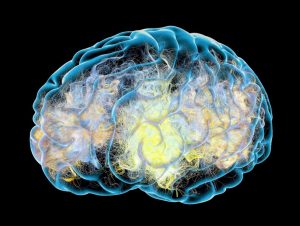The concept of stress and its impacts on general health has become more prominent, particularly in recent years, with many beginning to prioritize their mental and physical health more than ever before.

However, stress’s impact on the brain isn’t often discussed and is now being researched more extensively in the scientific and medical communities.
As the most complex organ in the human body, the brain is crucial for life but vulnerable to injury, susceptible to damage from several environmental stimuli, stress being one of them.
Stress isn’t inherently negative, at least in moderate amounts, and it’s a part of normal day-to-day life. Yet, stress, if not managed properly, can become chronic. Chronic stress can result in several undesirable consequences, particularly as it pertains to the brain.
In what follows, we’ll be discussing what stress is by definition and how it can negatively affect the health of the brain if not managed proactively, ultimately impeding an individual’s quality of life as a result.
Stress

Stress is categorized by some level of psychological pain or internal struggle between what we perceive internally and what we experience externally. Stress occurs when our internal dialogue fails to align with our external environment.
As a biological mechanism, stress impacts the hypothalamus, pituitary glands, and adrenal glands, excreting hormones such as epinephrine and cortisol when triggered. Historically, this control system has been identified as a means of protection from external threats and has the recognized name of the fight-or-flight response.
While more beneficial to our ancestors, today, this fight-or-flight response is often an overreaction to an inaccurate perception of reality. It leads to a build-up of physical tension, bodily reaction, and mental turbulence, thus affecting the way we think, feel, and act during a given situation. Thus, stress often occurs in scenarios where it does more harm than good.
Effects of Stress on the Brain
When experiencing stress, the body’s natural response is to release cortisol, the stress hormone of the body produced by the adrenal glands. While cortisol can play a beneficial role when excreted appropriately and in limited amounts, too much can lead to negative consequences, structural changes in the brain, and increases in white matter hyper-intensities.
High cortisol levels experienced for prolonged periods of time have been shown to be harmful to the brain and also to reduce its overall volume and grey matter. This process also leads to some other consequences.
The following are several negative effects of stress, particularly chronic stress, on the brain and its long-term health.
Memory Impairment
According to a study published in Nature Neuroscience, chronic stress can lead to impaired memory. This study also indicated that the impaired memory often continued for weeks, even after the elimination of the stressful environment that caused it.
Impaired memory may involve the inability to remember a past conversion, what medication to take, or how to perform a simple task that you perform every day. It’s also somewhat of a self-perpetuation, as impaired memory can also lead to more stress.
Grey Matter Reduced
While the overall size of the brain is unlikely to “shrink,” chronic stress has been shown to reduce the grey matter in areas of the brain associated with learning, memory, and emotion.
If not managed, chronic stress will only lead to further loss of grey matter and, thus, a loss of protection against future stress. Again is seen the self-perpetuation with a residual cycle of constant stress causing constant brain damage and impairments.

Brain Cells Degenerate
Chronic stress can also lead to a loss of brain cells via the death of neurons. This brain cell degeneration explains the loss of memory during times of stress. This process occurs in the hippocampus, a region of the brain responsible for learning and memory formation. The hippocampus is hypersensitive to stress.
Brain cell degeneration has been linked to high levels of cortisol, which is a condition occurring in times of stress. This degeneration and death of brain cells result in long-term damage.
Prevention Of Stress
There are ways to protect the brain from the cumulative effects of stress. A couple of useful management techniques to protect and strengthen the brain are quality sleep and meditation with intentional breathing. An argument can be made that the most beneficial preventative activity is quality sleep.
Final Thoughts
While not all stress is bad and can, in fact, be beneficial, chronic stress can have damaging effects, both on general health and on the brain. These effects ultimately lead to decreased ability to learn, remember, and manage emotion, both in the short term and long term.
Affecting every aspect of life, chronic stress not only impacts how we think and feel but also impacts the internal structure of the brain, including the hippocampus, prefrontal cortex, hypothalamus, and amygdala.
